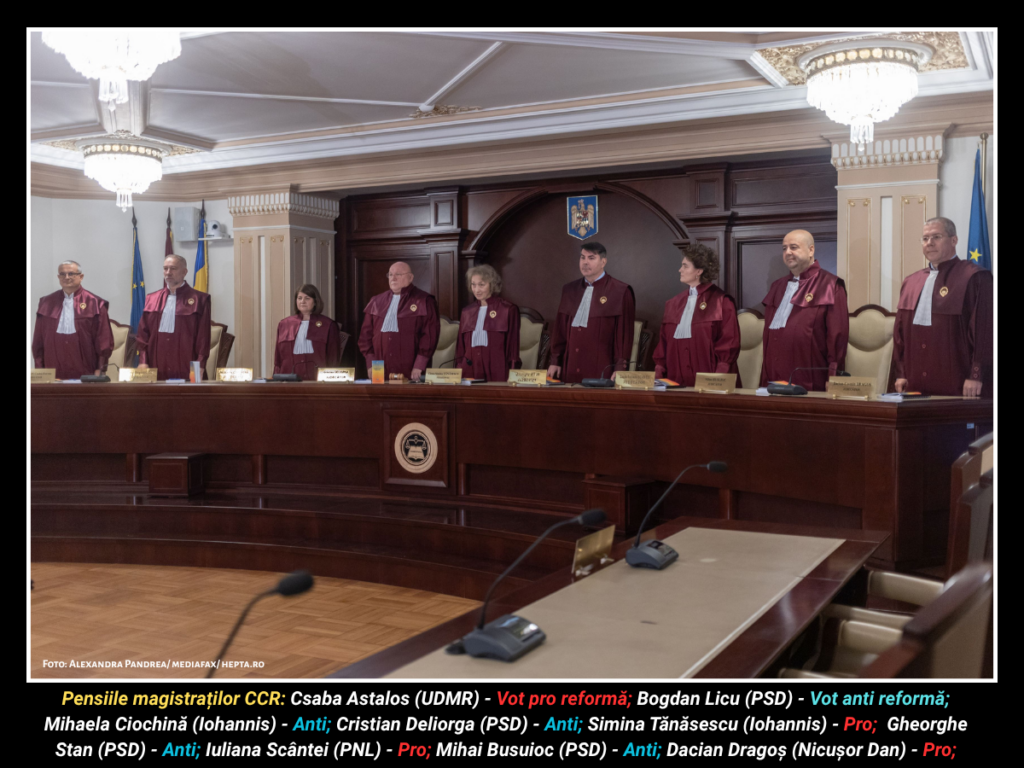Laura Ștefan, Executive Director of Expert Forum, specialist in anticorruption and legal reform, argues that a large part of the responsibility for the situation created lies with political leaders who have sent easily controlled or unqualified individuals to the Constitutional Court.

The victory of magistrates, who retain their privileges, over the Government was confirmed by a 5-4 vote. Judges appointed by PSD, plus one imposed by Iohannis, prevailed, allowing Romanian magistrates to continue retiring at the age of 40 and receive a pension equal to their salary.
What does the Constitutional Court's decision mean for the balance within the coalition and the political situation in Romania?
I believe that the CCR decision, paradoxical or not, reflects the situation within the coalition. We are talking about a 5-4 outcome, in which judges supported by PSD, plus the judge appointed by President Iohannis, tipped the balance towards a decision that brings a bitter smile to many.
It is hard to understand why so many postponements were needed to finally realize that a 30-day deadline was not met — a relatively simple matter if this deadline was truly considered constitutionally relevant, treated as such, and in previous Court decisions.
- PSD leaves the coalition meeting again. Grindeanu threatens Bolojan if he takes on the special pension reform again
What will happen next?
The decision invalidates the Government's project on grounds related exclusively to procedure — the so-called extrinsic reasons.
The Court did not examine the substance, but only how the legislative procedure was followed. This means that the Government can redo the process by respecting the 30-day deadline, then either resubmit the project to Parliament or once again take responsibility for an identical or modified project.

So, did the CCR leave open the possibility for the law to be subsequently challenged on its merits?
Exactly. A decision of unconstitutionality based on extrinsic reasons does not prevent the same law, once readopted, from being challenged again, but this time on its merits.
In a subsequent stage, the Court could declare the legislative act unconstitutional on intrinsic grounds, that is, due to its content.
However, isn't it strange that there were two postponements if the decision in the end was so simple?
I also believe that the successive postponements were completely unjustified, considering the outcome. If we are talking about an obvious procedural matter, it could have been settled from the first hearing.
Furthermore, the Court now opens a complex discussion because our legislation contains numerous approval procedures without clear deadlines. If the CCR says there are "implicit" deadlines, then we will need to understand how these will be applied in other situations. We await the Court's reasoning for clarifications.
The fact that the solution was delayed and only focused on procedure does not indicate a negotiation among the CCR judges?
The successive delays inevitably raise questions, and the 5-4 score shows that there are major divergences within the Court.
If things were clear, we would have had unanimity. But we don't, so tensions are visible.
Is there any resemblance to the case where the CCR decided to ban the publication of asset declarations?
Only partially. In the case of asset declarations, the Court delved into the substance and invalidated the act based on transparency and comprehensiveness reasons.
The only real similarity is the political reaction — both then and now, politicians promise swift interventions. I hope we do not have the same outcome, as it would mean another failed reform.
Many commentators say that politicians no longer have real leverage in the issue of special pensions for magistrates. Is this true?
I believe they do have leverage, they just need to use it. For example, this approval could have been requested on time, respecting the 30-day deadline. Moreover, let's not forget: constitutional judges are politically appointed. We cannot say it is not desired as if it were an inevitable fate.
If we appoint people based on political criteria, those criteria will be evident in the CCR decisions. Politicians must take responsibility for their own appointments.
Is reform of magistrates' pensions still possible in the current situation?
Yes, but with attention to details. Politicians face a highly legally prepared professional category — the magistrates. It is clear that the latter will use all legal tools to defend their interests.
Politicians cannot complain about the situation created. The solution is to appoint competent individuals to key positions and enact laws that cannot be dismantled procedurally.

